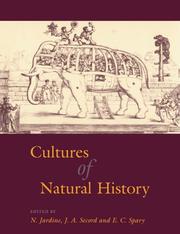| Listing 1 - 9 of 9 |
Sort by
|

ISBN: 0226610888 0226610861 Year: 1995 Volume: *26 Publisher: Chicago Chicago university press
Abstract | Keywords | Export | Availability | Bookmark
 Loading...
Loading...Choose an application
- Reference Manager
- EndNote
- RefWorks (Direct export to RefWorks)
Morphology (Animals) --- Study and teaching (Higher) --- History --- Animal morphology --- Animals --- Body form in animals --- Zoology --- Morphology --- Germany --- 19th century --- Morphology (Animals) - Study and teaching (Higher) - Germany - History - 19th century. --- Morphology (Animals) - Germany - History - 19th century. --- History.
Book
ISBN: 9780226610894 0226610896 9781282239869 9780226610924 0226610926 Year: 2009 Publisher: Chicago University of Chicago press
Abstract | Keywords | Export | Availability | Bookmark
 Loading...
Loading...Choose an application
- Reference Manager
- EndNote
- RefWorks (Direct export to RefWorks)
Philosophy of nature --- Nature protection --- Evolution. Phylogeny --- General ecology and biosociology --- History --- anno 1800-1899 --- anno 1900-1999 --- Germany --- Biotic communities --- Ecology --- Natural history --- Natural theology --- Nature --- Nature, Philosophy of --- Biology --- Science --- History, Natural --- Natural science --- Physiophilosophy --- Environmental sciences --- Population biology --- Balance of nature --- Bionomics --- Ecological processes --- Ecological science --- Ecological sciences --- Environment --- Environmental biology --- Oecology --- Biocenoses --- Biocoenoses --- Biogeoecology --- Biological communities --- Biomes --- Biotic community ecology --- Communities, Biotic --- Community ecology, Biotic --- Ecological communities --- Ecosystems --- Natural communities --- Social aspects --- Philosophy
Digital
ISBN: 9780226610894 0226610896 9781282239869 Year: 2009 Publisher: Chicago University of Chicago Press
Abstract | Keywords | Export | Availability | Bookmark
 Loading...
Loading...Choose an application
- Reference Manager
- EndNote
- RefWorks (Direct export to RefWorks)
Philosophy of nature --- Nature protection --- Evolution. Phylogeny --- General ecology and biosociology --- History --- anno 1800-1899 --- anno 1900-1999 --- Germany
Book
ISBN: 022644645X 9780226446592 022644659X 9780226446318 022644631X 9780226446455 Year: 2017 Publisher: Chicago London
Abstract | Keywords | Export | Availability | Bookmark
 Loading...
Loading...Choose an application
- Reference Manager
- EndNote
- RefWorks (Direct export to RefWorks)
Individuals are things that everybody knows-or thinks they do. Yet even scholars who practice or analyze the biological sciences often cannot agree on what an individual is and why. One reason for this disagreement is that the many important biological individuality concepts serve very different purposes-defining, classifying, or explaining living structure, function, interaction, persistence, or evolution. Indeed, as the contributors to Biological Individuality reveal, nature is too messy for simple definitions of this concept, organisms too quirky in the diverse ways they reproduce, function, and interact, and human ideas about individuality too fraught with philosophical and historical meaning. Bringing together biologists, historians, and philosophers, this book provides a multifaceted exploration of biological individuality that identifies leading and less familiar perceptions of individuality both past and present, what they are good for, and in what contexts. Biological practice and theory recognize individuals at myriad levels of organization, from genes to organisms to symbiotic systems. We depend on these notions of individuality to address theoretical questions about multilevel natural selection and Darwinian fitness; to illuminate empirical questions about development, function, and ecology; to ground philosophical questions about the nature of organisms and causation; and to probe historical and cultural circumstances that resonate with parallel questions about the nature of society. Charting an interdisciplinary research agenda that broadens the frameworks in which biological individuality is discussed, this book makes clear that in the realm of the individual, there is not and should not be a direct path from biological paradigms based on model organisms through to philosophical generalization and historical reification.
Biology --- Variation (Biology) --- Philosophy. --- autonomy. --- biological hierarchy. --- identity. --- individuality. --- individuation. --- levels of individuality. --- major transitions. --- organism. --- part-whole relations. --- pluralism.

ISBN: 0226073718 Year: 2002 Publisher: Chicago (Ill.) University of Chicago press
Abstract | Keywords | Export | Availability | Bookmark
 Loading...
Loading...Choose an application
- Reference Manager
- EndNote
- RefWorks (Direct export to RefWorks)
Science --- Science --- History --- Political aspects --- History
Book
ISBN: 9782752602305 9782815901833 2815901838 Year: 2007 Publisher: La Tour d'Aigues : Éd. de l'Aube,
Abstract | Keywords | Export | Availability | Bookmark
 Loading...
Loading...Choose an application
- Reference Manager
- EndNote
- RefWorks (Direct export to RefWorks)
Scientifiques amateurs. --- Environnement --- Protection --- Participation des citoyens. --- Scientific recreations --- Science --- Jeux scientifiques --- Sciences --- Experiments --- Expériences
Book

ISBN: 1283369974 9786613369970 0813550270 9780813550275 9780813548753 0813548756 Year: 2010 Publisher: New Brunswick, NJ
Abstract | Keywords | Export | Availability | Bookmark
 Loading...
Loading...Choose an application
- Reference Manager
- EndNote
- RefWorks (Direct export to RefWorks)
Knowing Global Environments brings together nine leading scholars whose work spans a variety of environmental and field sciences, including archaeology, agriculture, botany, climatology, ecology, evolutionary biology, oceanography, ornithology, and tidology. Collectively their essays explore the history of the field sciences, through the lens of place, practice, and the production of scientific knowledge, with a wide-ranging perspective extending outwards from the local to regional, national, imperial, and global scales. The book also shows what the history of the field sciences can contribute to environmental history-especially how knowledge in the field sciences has intersected with changing environments-and addresses key present-day problems related to sustainability, such as global climate, biodiversity, oceans, and more. Contributors to Knowing Global Environments reveal how the field sciences have interacted with practical economic activities, such as forestry, agriculture, and tourism, as well as how the public has been involved in the field sciences, as field assistants, students, and local collaborators.
Science --- Natural science --- Natural sciences --- Science of science --- Sciences --- Fieldwork --- History.
Book

ISBN: 9781501729942 Year: 2018 Publisher: Ithaca, NY
Abstract | Keywords | Export | Availability | Bookmark
 Loading...
Loading...Choose an application
- Reference Manager
- EndNote
- RefWorks (Direct export to RefWorks)


ISBN: 0521558948 0521453941 9780521453943 9780521558945 Year: 1996 Publisher: Cambridge [etc.] Cambridge University Press
Abstract | Keywords | Export | Availability | Bookmark
 Loading...
Loading...Choose an application
- Reference Manager
- EndNote
- RefWorks (Direct export to RefWorks)
natural history --- science --- Civilization --- Natural history --- History. --- Iconography --- Nature --- Cultural history --- History --- Sciences naturelles --- Civilisation --- Histoire --- science [modern discipline] --- Natural history - History --- Civilization - History --- cultuurgeschiedenis --- geschiedenis van de wetenschappen
| Listing 1 - 9 of 9 |
Sort by
|

 Search
Search Feedback
Feedback About UniCat
About UniCat  Help
Help News
News